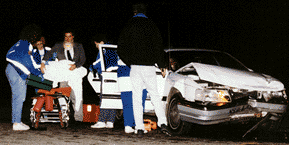Amnesia Diagnosis Requires Later Analysis of Memory
Amnesia Diagnosis Needs Full Inquiry
Call me at 800-992-9447

No effort to make an Amnesia Diagnosis was made after either of my serious car wrecks. I am the person wearing a suit, tie and neck brace.
To make an amnesia diagnosis, a doctor must inquire as to memory for periods later than the immediate events surrounding the time of the brain injury. If one takes Conan’s words literally, he remembers seeing stars, but remembers little else of the day of his accident. Yet he clearly describes what he felt, even though amnestic for the rest of the day.
As stated earlier, the ability of the brain to save islands of memories in a sea of amnesia, is non-reproducable in the digital world. Two significant mechanisms, which are likely closely connected, clearly have the capacity to push their way through the fog of concussion. The first process that gets priority in memory log jams is adrenaline. The second is adding an intense emotional overlay to a memory.
The Effect of Adrenaline on Memory
Current amnesia diagnosis protocols do not take into account the role of adrenaline. Adrenaline makes everything in the body work better, in bursts. It is not just super human strength, but can also be extraordinary performance of the brain. When scared or in crisis, we often times can summon extraordinary concentration or mental capacity. That extraordinary focus may also result in extraordinary detail in our memories.
When a concussed person does find his or her way to the Emergency Room, the first thing that typically gets asked is: what do you remember of what happened? The second is: did you get knocked out? Both questions are seriously flawed in methodology.
Starting with the second, if you presume that someone who is knocked out will have amnesia of the event, how can you ask them what happened to them at a time they were amnestic? We would hope that most experienced ER doctors see the inherent conflict in relying on the answer to such a question from the concussed person.
The more subtle but more significant problem is assuming that because someone has memory of an event, that means they weren’t concussed in the event. This is simply not true and it ignores the well recognized principle that concussed individuals can have islands of memory during periods of significant amnesia. Amnesia is the inability to record continuous memory, not total absence of memory. The islands of memory a concussed person will most likely remember are those things where adrenaline played the greatest role, such as the accident itself.
I Remember the Scary Moments of My Car Wrecks
If you have ever been a car wreck that you do remember, especially a serious car wreck, it is something you will remember for the rest of your life. I have been in two serious wrecks and I remember exquisite details of what I was doing just before and in the hours after the wreck. One of those wrecks was in 1975 and the other in 1993. I even remember the date and hour of the 1993 wreck.
My brain remembers them best because they were most important to me. It also remembers them best because they were the most scary. What I don’t remember about the more serious of those accidents is the ambulance ride. And I should remember it because I was in pain and strapped to a board.
In 1975 if you could walk and talk in an Emergency Room and didn’t have any broken bones, that was all they were concerned with. I was discharged home. No one ever asked me a single question about amnesia. There was no effort towards an amnesia diagnosis because I clearly wasn’t brain injured. Yet, that undiagnosed brain injury completely derailed my life and career for at least 12 months. For an interview with me where I discuss my 1975 accident and its effects on my life, click here.
In contrast in the 1993 accident where I may not have suffered a concussion, I remember the ambulance ride. I also intensely remember the frustration of having to have my cervical x-rays repeated because the size of my shoulder bones made it hard to image my lower cervical vertebra. One of the most delightful moments I can remember was when they finally removed the strap from my forehead. The burst of relief was roughly equivalent to what one might have when novacaine is put in a scratched eye. Had an amnesia diagnosis been considered in 1993, it would have been ruled out. Unlike my 1975 wreck, my neck injury was far more of a problem than any brain injury I might have suffered.



